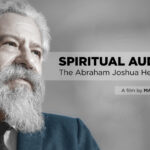Rabbi Michael Marmur, PhD
Had it not been for him, I would have done less, cared less, thought less, lived less.
Associate Professor of Jewish Theology, Hebrew Union College-Jewish Institute of Religion
Jerusalem, Israel
A Jewish Perspective
I never met Abraham Joshua Heschel. I was a 10-year old Londoner when he died. Nonetheless, he has been a presence in my life for as long as I can recall. He lived on my father’s bookshelves, where the mysterious paradox inherent in such titles as God In Search of Man and Who Is Man? caught my young attention. He came alive when his aphorisms, more evocative than abstract reasoning or unbridled polemic, were quoted in sermons and conversations.
As a young rabbi casting around for a doctoral research topic, my initial idea had been to compare aspects of the thought of Heschel and Mordecai Kaplan. I was guided by the instinct that Israel (where I had moved) needed to undergo significant processes both of Kaplanization and of Heschelization, and I wanted to help think this through. When I decided that acquiring expertise in the work of both of these giants of 20th-century Judaism was overly ambitious, it was clear to me with whom I preferred to spend the time I would dedicate to this research.
I was in the library of the University of Haifa, rereading God In Search of Man slowly and carefully, when my particular link to Heschel was forged. I noticed that appended to almost every chapter were intriguingly extensive and suggestive endnotes. What was their purpose and to whom were they directed? This question—and the questions it in turn triggered—have preoccupied me for the past 30 years.
It may seem odd to have developed such an interest in an aspect of Heschel’s work that is so literally marginal. Most of those who have been drawn into Heschel’s magnetic field have been attracted by his spirituality or his activism or his language. Drawn to all these as I surely was and still am, it was in fact his footnotes that captivated me. I was intrigued by the way in which Heschel based his challenging theology not in the dictates of Kantian philosophy (which he respected) or Freudian psychology (which he respected less), but from within the rich and varied sources of Judaism. He turned to these sources not as literary embellishments, but as urgent and vibrant expressions. The great Jewish philosopher Hermann Cohen had sought to make the case for a Religion of Reason Out of the Sources of Judaism, but here was an approach to Judaism and to life that was not just derived from Jewish sources—it was marinated in them, immersed and informed by profound learning. I was hooked.
Since then, following Heschel’s writings has provided a more rigorous syllabus than any I have encountered in a seminary or university. That which Heschel had committed to memory at a young age, I have intended to chase up and track down. He has not only been the primary object of my research, he has also been my teacher.
It is certainly the case the Abraham Joshua Heschel was a very learned Jew. This places him in select company, but he was not unique in his erudition. It was the combination of deep learning with his commitment to action, his unwillingness to stay ensconced in his study room, his engagement with the great questions of his day that set him apart. I hear Heschel’s voice every time I am tempted to settle for vapid progressive slogans, and every time I am tempted to stay in my comfort zone when I should be protesting. His particular form of praxis, the welding together of doing and learning, has been my principle guide.
One of the hundreds of works I would never have encountered were it not for Heschel is entitled To’ameha Chayyim Zachu. This expression has its roots in the additional Sabbath prayer, and it relates to the Sabbath itself. Those who taste and experience it are privileged with life. As I consider decades of reading, thinking, and responding to Heschel, it is this expression that comes most readily to mind. To taste Heschel, his remarkable combination of learning and activism, his call to wonder and response, his critique and his poetry, his hints and his slogans, his certainties and his vulnerability, his intellect and his soul is a dose of life. Had it not been for him, I would have done less, cared less, thought less, lived less.
I am surely not alone. Fifty years after he breathed his last, Abraham Joshua Heschel continues to offer a taste of life for contexts and generations he could not have imagined. So long as he is quoted (and misquoted), so long as his example serves as inspiration, he has not breathed his last.
Reading through the Heschel papers at Duke University some years ago, I shed a tear. I had just come across a page (there are many of them to be found there) upon which Heschel had written out a teaching. This one is from Rabbi Nachman of Breslov. To paraphrase, "When a student repeats the teaching of a tanna, a foundational sage, there is a kind of embrace between the tradition and the tradent, the propagator and the broadcaster. You kiss the tanna, and the tanna kisses you. I never met Abraham Joshua Heschel. But I sense his embrace."
His memory is for a blessing, and those who experience it are privileged with the gift of life.

